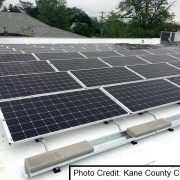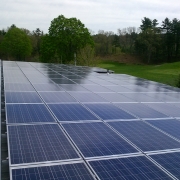Massachusetts DPU Expands Net Metering Program from 10kW to 25kW
In an exciting development for Massachusetts residents, the state’s Department of Public Utilities (DPU) has announced a major expansion of its net metering program. The new policy increases the allowable system size for residential solar installations from 10kW to 25kW. This change opens the door for homeowners to install significantly larger solar systems, enabling them to generate more of their own clean energy and further reducing their dependence on the grid.
What is Net Metering?
Net metering allows individuals and businesses with solar power systems to receive credit for any excess electricity they generate and send back to the grid. When these systems produce more energy than is needed, the surplus is sent to the utility grid, and homeowners receive credits on their energy bills. The program incentivizes renewable energy adoption by offsetting the cost of solar panel installation and providing long-term savings on electricity.
Previously, Massachusetts had limited the size of residential solar installations to 10kW for most homes. While this system size was sufficient for many, it did not meet the needs of larger households or homes with high electricity usage. Now, with the increased cap of 25kW, more homeowners can install larger solar systems that better align with their energy consumption needs.
Why the Change Matters
The DPU’s decision to expand the net metering cap is a game-changer for Massachusetts homeowners. This adjustment directly supports the state’s clean energy goals by allowing residents to play a bigger role in the renewable energy transition. Here’s why this expansion is so important:
- Greater Energy Independence: With a 25kW system, homeowners can generate more of their own electricity, which translates to greater energy independence. For larger homes or those with high electricity demand (such as homes with electric vehicles, swimming pools, or large appliances), the 10kW limit was often insufficient. The 25kW cap gives homeowners more control over their energy consumption, reducing their reliance on the grid and offering more significant savings on utility bills.
- Enhanced Financial Savings: By installing a larger solar system, homeowners can produce more electricity, which may offset a larger portion of their electricity bills. This is particularly beneficial for those in areas with high electricity rates. The expansion means that more homeowners can fully benefit from solar power and enjoy long-term financial savings as they generate more of their own energy.
- Addressing the Needs of Larger Homes: Homes with higher energy needs often face challenges when trying to fully offset their energy consumption with a 10kW system. The new cap allows homeowners with larger properties or higher electricity usage to install systems that meet their needs. This makes solar power a viable option for more families, particularly those in suburban or rural areas where larger homes are common.
- Incentivizing More Solar Installations: With the option to install larger systems, many homeowners who were previously hesitant due to size limitations may now reconsider solar adoption. The DPU’s expansion could lead to an uptick in solar installations across the state, boosting the local solar market and creating more jobs in the renewable energy sector.
Impact on Solar Industry and Massachusetts’ Clean Energy Future
The DPU’s decision to expand the net metering cap from 10kW to 25kW is poised to have far-reaching implications for the solar industry in Massachusetts. The change will not only benefit individual homeowners but also contribute to the growth of the state’s renewable energy economy. By making it easier for homeowners to install larger solar systems, Massachusetts is further solidifying its position as a national leader in clean energy adoption.
The expansion of net metering also supports Massachusetts’ goal of reaching net-zero emissions by 2050. Solar energy is a key component of this plan, and by removing restrictions on system sizes, the state is enabling more residents to participate in the clean energy transition. This policy shift could lead to a significant increase in the amount of solar energy generated across the state, helping Massachusetts meet its climate goals while promoting energy equity.
Simplified Process for Homeowners
The DPU’s expansion also simplifies the process for homeowners looking to install larger solar systems. With a larger system capacity now allowed, the application and approval process for these installations is likely to become more straightforward for homeowners. This means that more people will be able to take advantage of net metering without encountering as many regulatory barriers or lengthy approval times.
What’s Next for Massachusetts Solar?
The expansion of net metering from 10kW to 25kW is just the latest step in Massachusetts’ ongoing commitment to renewable energy. As the state continues to move toward a more sustainable energy future, we can expect further innovations in policy and technology that make clean energy even more accessible to all residents.
With this change, Massachusetts is setting the stage for even more widespread solar adoption and continued leadership in the fight against climate change. By allowing homeowners to install larger systems, the state is ensuring that residents have the tools and incentives they need to generate clean, renewable energy.
Contact us today for a free no-obligation solar quote!








